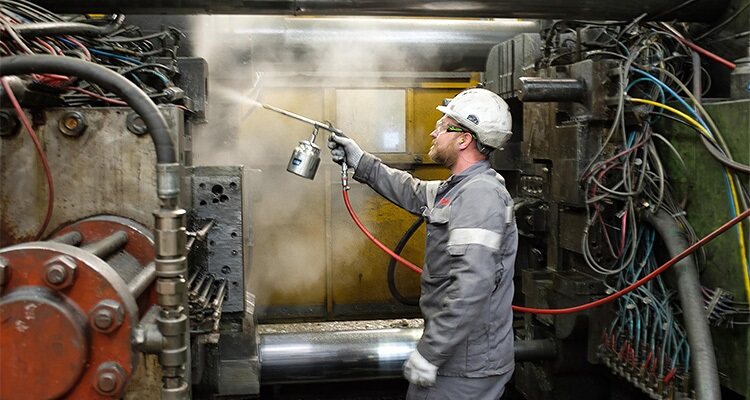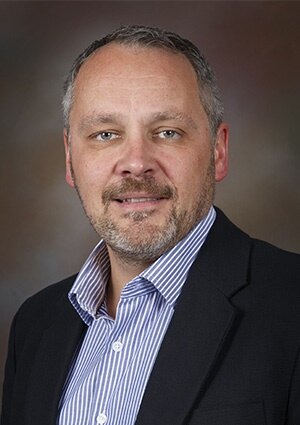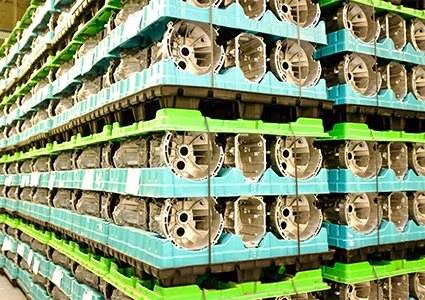
Ryobi Aluminium Casting is turning its attention to the industry’s sustainability movement
Ryobi Aluminium Casting (Ryobi), under the leadership of Managing Director, Marco Emig, is a testament to resilience, evolution, and global prowess. With roots stemming back to Japan, where the company was founded in 1943, the Ryobi Group has expanded steadily to include multiple manufacturing facilities across Japan, China, USA, Mexico, Thailand, and Europe. Ryobi’s story in the UK began in 1990, a chapter that has seen an impressive transformation.
Marco reflects on the trajectory of the UK’s business with pride: “We’re part of a global organization, and our roots and head office are based in Japan. Here in the UK, however, we were founded in Ireland, and the plant has been expanding ever since,” he begins. What started as a modest setup with four die casting machines has burgeoned into a powerhouse with a portfolio of 24 machines of varying capacities.

Decades of experience
The early years saw Ryobi primarily functioning as a supplier of ‘cast only’ products and customers were required to undertake additional machining to obtain the finished item. However, the company’s commitment to innovation became evident in 2002 when it took a step forward, and incorporated CNC-machining and assembly operations into its repertoire. This strategic move not only enhanced its offerings but positioned Ryobi as a comprehensive solution provider in a highly competitive market.
The real turning points came in 2013 and 2017, marked by significant sales growth attributable to the inclusion of new customers in its ever-expanding portfolio. These years not only solidified Ryobi’s market presence but also underscored its ability to adapt to dynamic industry needs.
“In 2020,” Marco continues, “Ryobi was awarded its first project for an electrified driveline, a testament to our commitment to technology. Fast forward to 2023, we celebrated another milestone with the award of our first project for a fully electric driveline.” This recognition aligns seamlessly with the global shift towards sustainable and eco-friendly solutions.
The story of Ryobi is not just one of growth in numbers and scale, but a narrative woven with threads of innovation, adaptability, and a keen eye on the future. In this story, we explore the intricacies of Ryobi’s operations, the challenges, and the vision that propels the business forward in the ever-evolving landscape of aluminum casting.
When asked about what separates Ryobi from its competitors, Marco highlights that decades of gained expertise is the key to the business’ success. “I believe it is the combination of 80 years’ experience in die-casting, a global manufacturing network and the capability for R&D work, manufacturing of our own tools and finally using all that for running our production. A further aspect is the flexibility and agility of the workforce in head office, which allows us to transfer knowledge via long-term assignments at our various global manufacturing locations,” he outlines.
Furthermore, when it comes to the operational facilities, Ryobi depends on a high-level of automation across its manufacturing processes. “Most CNC machining lines run fully automated and only require manual labor to load and unload the cell. In addition, the casting process has robots in each and every cell to unload the part from the die and in many cases also completes the first and initial finishing touches of the process,” says Marco, and when asked about whether there are any upcoming investments to improve innovation, he shares that the company is keen to do what is necessary to move towards Industry 4.0. “We have spent a lot of effort and resource to develop our own on-time production monitoring system. It basically is part of a journey to Industry 4.0, but the system is tailor-made and therefore the best possible fit to suit our own internal processes.”
With this level of tech, the business is able to fulfil some impressive contracts. One in particular requires the business to establish a fully electric motor house, as Marco elaborates. “It sounds rather simple, but we need to follow our internal processes and procedures to ensure APQP is followed which will enable a safe launch of this rather complex product. Like all products we innovate, the tools and initial samples will be produced in our head office in Japan and once deemed acceptable, will be transferred to us.
Continuous improvement
“We do not have to invest heavily in any new equipment, rather the product will run on existing machinery. All work will be around setting up the ideal process for quality products and the basis for that will be laid in head office, supported by our local engineers to ensure best possible knowledge transfer.”
Amid the automotive industry’s shift towards electric vehicles, Ryobi, as a high-pressure die casting company, stands strong against the waves of change. Marco reassures customers, stating: “Thankfully, there is not really any significant impact. The electrified drivelines use a huge amount of aluminum components and parts can be produced with existing equipment, using known processes.”
Marco’s perspective sheds light on the adaptability of die casting in the face of electric vehicle dominance. While the industry undergoes a transformation towards electrification, Ryobi leverages existing machinery and processes to meet the demand for components. Marco notes a trend towards tighter tolerances and higher specifications, a pursuit of excellence not exclusive to electric vehicles, but, rather, indicates the industry’s wider commitment to continuous improvement.
Instead of viewing the shift to electric vehicles as a challenge, Marco views it as a colossal opportunity. He emphasizes: “We see the change to electric vehicles as a huge opportunity as the content of aluminum products increases and new potential customers emerge in the market.” For Ryobi, the surge in demand for components in electrified drivelines is not just a trend to navigate but a strategic opening to explore new horizons in the ever-evolving landscape of die casting.
Stepping away from the technical side of the business, the conversation then turns towards its people. Marco’s perspective on the company culture is that the business values respect, trust and integrity. “Whilst Ryobi Limited is a company operating on a global scale, we never really stopped being a family-owned and run company. Loyalty is crucial to us and accordingly, at least as far as I’m concerned, we also get that back from our employees. No doubt the labor market is more challenging, but I am very happy that the group of employees, celebrating a work anniversary this year, have more than 500 years combined of Ryobi experience – no doubt a rather rare achievement these days.”
Looking ahead
Marco goes on to share insights into the company’s plans, revealing a strategic outlook based on stability, growth, and a commitment to social responsibility. When questioned about the possibility of expanding the operational footprint, Marco says: “Not at the moment. We have heavily invested in the last ten years and currently focus on maintaining and sustaining the current operations. Having said that, I would not rule out a change of plan in case of an interesting opportunity coming along.”
This approach towards consolidation highlights Ryobi’s dedication to the foundation it has meticulously built over the last decade. Marco’s openness to opportunities, however, opens space for potential shifts in the future. Looking ahead to 2024, Marco offers a candid reflection on the challenges faced in recent years, from a global pandemic to a supply chain crisis and geopolitical upheavals. “After a global pandemic, a global supply chain crisis, a war in Europe resulting in the energy price crisis, I really hope for a year with fewer challenges.” The latter part of 2023, however, brought signs of stabilization, offering a glimmer of optimism for the industry. Marco expresses the expectation that this positive trend will persist into 2024, bringing the industry back to where it was before Covid-19.
Taking its long-term scope one step further, Marco outlines Ryobi’s five-year plan, stating that there are strategies to see the company grow. Beyond maintaining a solid foothold in the market, the company has its sights set on expanding its share of products for electric vehicles.
Marco also emphasizes a pivotal focus on activities for CO2 emission reduction, aligning Ryobi with the broader industry’s commitment to sustainability. “Apart from increasing our share of products for electric vehicles, a big focus will be on our activities for CO2 emission reduction. Of course, we also have a plan in place for that, and I hope we can beat our own set goals and targets.” The commitment to environmental stewardship is not just a strategic imperative but a moral obligation, reflecting Ryobi’s ethos.
Furthermore, Ryobi is dedicated to expanding its corporate social responsibility efforts. Marco highlights the transformative impact made in the community over the past two years and articulates a commitment to continued positive contributions. “We will continue to give back – this is what CSR is about!”
In conclusion, Ryobi seems well equipped for a future marked by strategic growth and commitment to social and environmental responsibility. Ryobi’s story demonstrates adaptability, innovation, and a steadfast dedication to a sustainable and impactful future.